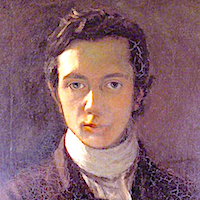

Tao Te Ching

Self-portrait 1802
William Hazlitt
1778 – 1830 CE
One of the English languages best art and literature critics of all time
The most influential art critic of his age, considered the best essayist in the English language, and one of the English language’s greatest critics; Hazlitt befriended and helped Coleridge, Wordsworth, Keats, Jeremy Bentham, Stendhal and many of the 19th century’s most important writers. The keen psychological insight that makes him still relevant today however, didn’t go over very well in his own time. Both Wordsworth and Coleridge retaliated to his criticism by spreading negative rumors. Also a poet, journalist, and philosopher; he was devoted to his work but seldom popular enough to earn sufficient income, he had to depend on his wife’s independent wealth. When she left him, he continued his writing but sunk into poverty, illness, depression, and was “excommunicated from all decent society.”
Eras
Chinese
Qing dynasty (1644 – 1912 CE)Unlisted Sources
Characteristics, 1823
Round Table (1817)
Selected Essays
Sketches and Essays, 1839
Spirit of the Age (1825)
Table Talk, 1822
The Plain Speaker (1826)
The Spirit of Controversy, 1830
Quotes by William Hazlitt (16 quotes)
“Great thoughts reduced to a practice become great acts.”
from Table Talk, 1822
Comments: Click to comment
“All uneducated people are hypocrites.”
from Table Talk, 1822
Comments: Click to comment
“The power of attaching an interest to the most trifling or painful pursuits ... is one of the greatest happinesses of our nature”
Comments: Click to comment
“The power of attaching an interest to the most trifling or painful pursuits ... is one of the greatest happinesses of our nature”
Comments: Click to comment
“When a thing ceases to be a subject of controversy, it ceases to be a subject of interest.”
from The Spirit of Controversy, 1830
Comments: Click to comment
“The heaviest charge we can bring against the general texture of society is that it is commonplace.”
from Selected Essays
Comments: Click to comment
“The only vice that cannot be forgiven is hypocrisy. The repentance of a hypocrite is itself hypocrisy.”
from Characteristics, 1823
Comments: Click to comment
“Natural affection is a prejudice: for though we have cause to love our nearest connections better than others, we have no reason to think them as better than others.”
from Sketches and Essays, 1839
Comments: Click to comment
“We do not die wholly at our deaths: we have moldered away gradually long before. Faculty after faculty, interest after interest, attachment after attachment disappear: we are torn from ourselves while living.”
Comments: Click to comment
“Lord Byron makes man after his own image, woman after his own heart; the one is a capricious tyrant, the other a yielding slave... Whatever he does, he must do in a more decided and daring manner than any one else; he lounges with extravagance, and yawns so as to alarm the reader!”
from Spirit of the Age (1825)
Comments: Click to comment
“When a man can do better than everyone else in the same walk, he does not make any very painful exertions to outdo himself. The progress of improvement ceases nearly at the point where competition ends.”
Comments: Click to comment
“We imagine that the admiration of the works of celebrated men has become common because the admiration of their names has become so.”
from Round Table (1817)
Comments: Click to comment
“Love turns, with a little indulgence, to indifference or disgust; hatred alone is immortal.”
from The Plain Speaker (1826)
Comments: Click to comment
“Death conceals everything but truth, and strips a man of everything but genius and virtue. It’s a sort of natural canonization.”
Comments: Click to comment
“We learn to curb our will and keep our overt actions within the bounds of humanity, long before we can subdue our sentiments and imaginations”
from The Plain Speaker (1826)
Comments: Click to comment
Comments (0)